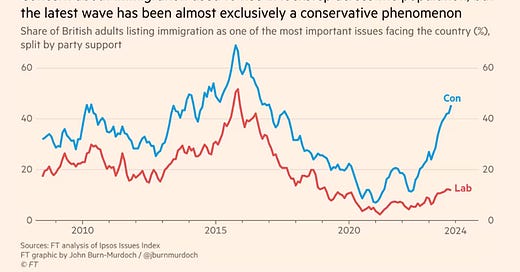What do Conservative voters really think about immigration?
Using a new AI research tool to understand the complexities
In the years following the Brexit referendum concern about immigration dropped massively, but in the last two years it has gone back up again. It is consistently appearing in third place in “top issues for voters” polls, after cost of living and the NHS.
There is an ongoing debate about why this is happening. One group – which includes former Theresa May advisers Nick Timothy and James Johnson – argue, intuitively, that it is a direct consequence of the big spike in net immigration since the end of the pandemic.
It shot up from 300k in 2019 to 700k last year driven by three main factors: humanitarian schemes for people coming from Ukraine and Hong Kong; an increase in international student numbers; and more work visas, particularly for health and social care.
That number will drop back naturally over the next few years as the humanitarian schemes wind down and student numbers re-balance after covid. But pressure on work visas is likely to increase, notwithstanding recent measures by the government to reduce them, simply because public sector pay is too low. We are now seeing the effect in professions outside health and social care. The number of teacher trainee applicants from outside Europe being accepted is up 57% year-on-year.
The counterargument made by me, and others, is that the growing worry about immigration is largely driven by increased attention by prominent right-wing politicians and their media allies. This is based on looking at which voters are saying it is an issue of major concern. As John Burn-Murdoch has helpfully shown the rise has been driven almost entirely by Tory supporters, in a way that hasn’t been true before.
Labour voters are much more likely to be actually affected by an increase in immigration. They are less likely to own a house outright, more likely to be of working age (and in lower paid employment), and more likely to live somewhere with high immigrant population. It is true, of course, that Conservative voters may still be aware of changes happening where they live or nationally. But it is definitely the opposite of what you’d expect if the shift was being driven by real-world effects as opposed to greater attention.
This matters because it affects how politicians think about policy. There may be good economic and social reasons for wanting to reduce immigration, particularly for low paid work, but misunderstanding public opinion could push the government into taking destructive or needlessly cruel stances, like new rules that require higher levels of earning for British citizens to bring non-UK spouses into the country.
It’s also important politically. If I’m right then the Conservatives, by taking about the issue so much, have increased salience on Reform’s strongest issue, and one where the populists can always out-promise a sitting government. (Not talking about it so much doesn’t mean you can’t do anything about it policy-wise.)
I’ve been looking for new ways to get to the bottom of what’s going on and my friends at Focaldata have designed a cool new tool that I’ve been allowed to experiment with. It uses an AI chatbot to conduct 30 min interviews with voters based on prompts I gave it, but asking its own follow-ups based on responses. This has the potential to give far more nuanced insight than a standard poll at a fraction of the cost of using a human interviewer. Unlike a focus group it avoids the danger of the most extrovert members dominating conversation or influencing others and it can be done at scale in a few hours.
We got 100 people who voted Conservative in 2019 to take part, I wanted to focus on this group as they are the ones driving the political conversation.1 The response was great, people interacted as they would with a person (they knew they were talking to an AI) and gave detailed answers. Initial research by Focaldata suggests participants find it a positive experience.2 In the spirit of transparency a link to all the transcripts and participant data is included at the end of the post.
So what did it tell us about immigration? And what are the lessons for both the Conservatives and Labour?
Keep reading with a 7-day free trial
Subscribe to Comment is Freed to keep reading this post and get 7 days of free access to the full post archives.




